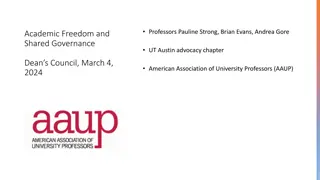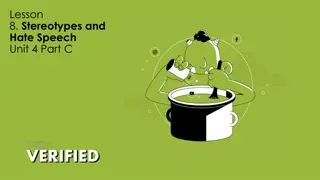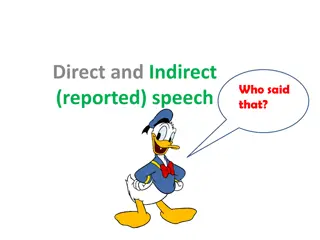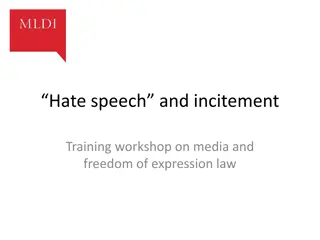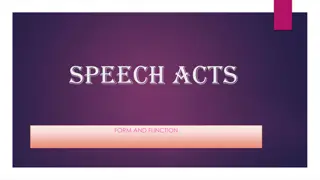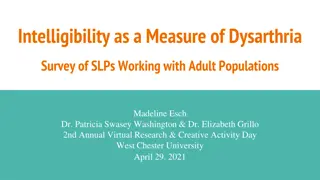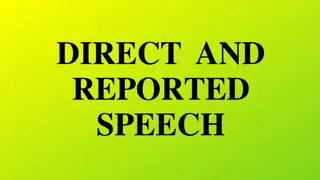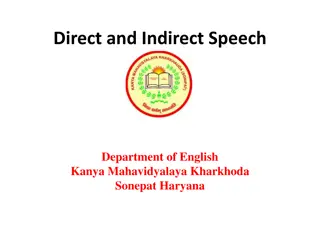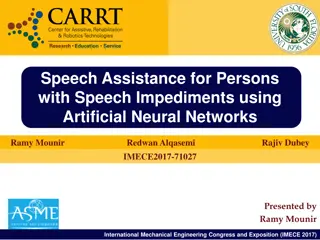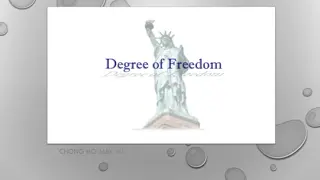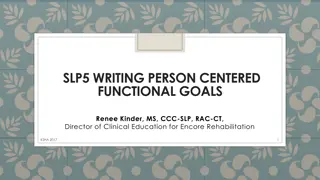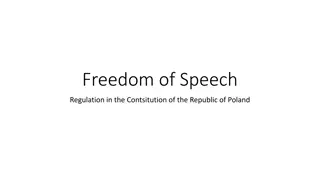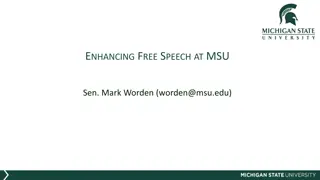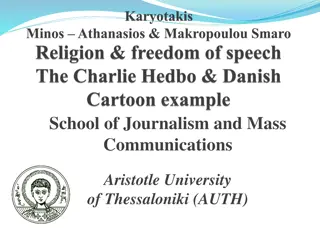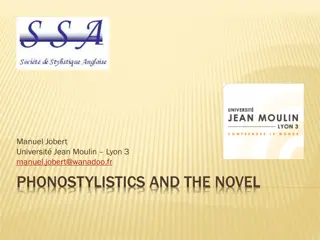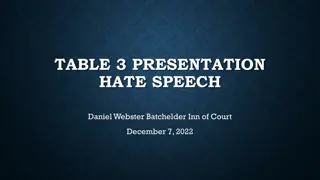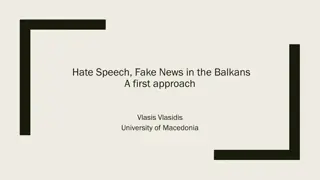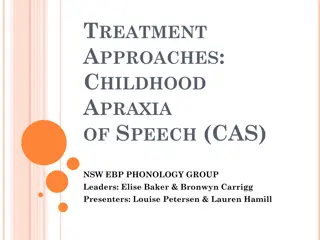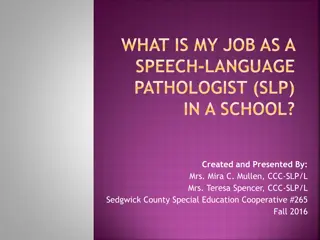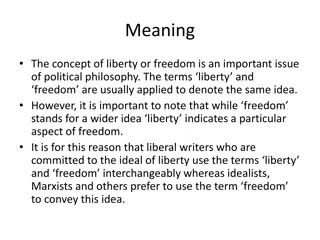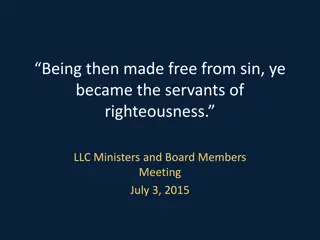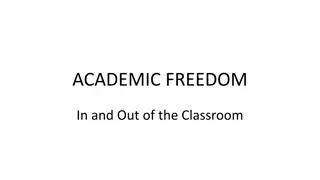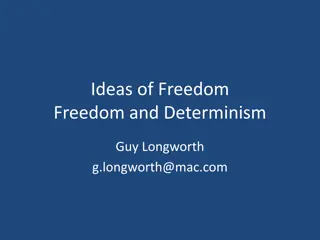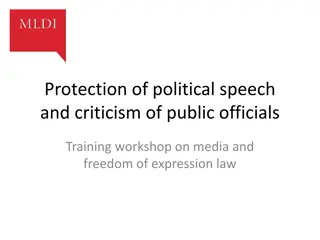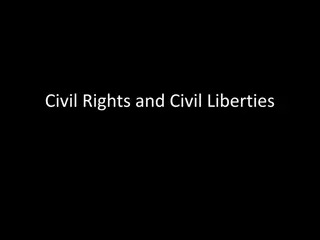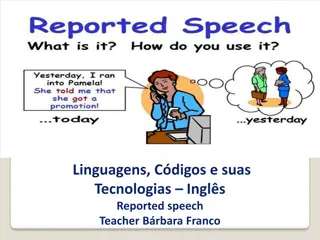Prevention and Combating of Hate Crimes and Hate Speech Bill [B.9B.2018]
The Prevention and Combating of Hate Crimes and Hate Speech Bill aims to address incidents motivated by prejudices through the creation of offenses of hate crimes and hate speech. It seeks to prevent and combat these offenses by defining hate crimes, hate speech, and establishing measures for prosec
1 views • 18 slides
Advocating Together for Academic Freedom - Importance and Principles
Advocating for academic freedom is crucial for the advancement of knowledge and quality education. The American Association of University Professors (AAUP) champions academic freedom, shared governance, and economic security for faculty members. The 1940 Joint AAUP/AAC&U Statement of Principles on A
4 views • 14 slides
Academic Freedom and Shared Governance Advocacy at UT Austin
Professors Pauline Strong, Brian Evans, and Andrea Gore lead the advocacy chapter at UT Austin, promoting academic freedom and shared governance. The American Association of University Professors (AAUP) plays a vital role in advancing these principles, supporting over 45,000 members. Principles of a
3 views • 12 slides
Panel Discussion on Academic Freedom
Academic freedom is a crucial aspect of higher education, enabling teachers to innovate, explore diverse viewpoints, and facilitate critical thinking. Organizations like AAUP and AAC&U advocate for shared governance and economic security to uphold academic freedom. The 1940 joint statement highlight
4 views • 8 slides
How to achieve financial freedom in 5 years
Welcome to the Financial Freedom Challenge!\nAre you ready to take control of your financial future and unlock the door to lasting prosperity? Join us on a journey toward financial freedom like no other.\nWhat is the Financial Freedom Challenge?\nThe Financial Freedom Challenge is a transformative p
0 views • 9 slides
Academic Freedom and Shared Governance in Higher Education
Academic Freedom and Shared Governance are foundational principles advocated by the American Association of University Professors (AAUP) to ensure educators have the freedom to explore, research, teach, and discuss without censorship. These principles empower educators to enhance student learning an
0 views • 9 slides
Understanding Stereotypes, Hate Speech, and Freedom of Speech
This lesson explores the topics of hate speech, stereotypes, and the boundary between freedom of speech and hate speech. It delves into the origins of hate speech, the connection between stereotyping and hate speech, and how stereotyping can lead to violence. The discussion also touches on the impor
2 views • 14 slides
Understanding Direct and Reported Speech in English
Explore the differences between direct and reported speech, learn how to convert direct speech into reported speech, and understand when to use each form in writing. Direct speech uses the speaker's actual words in quotes, while reported speech conveys the gist of what was said without using exact w
2 views • 20 slides
Understanding Hate Speech and Incitement in Media and Freedom of Expression Law
This workshop explores the legal implications surrounding hate speech, incitement, and freedom of expression. It delves into the prohibition of propaganda for war, advocacy of hatred, and the balance between state obligations and freedom of speech. Through case law examples like the Jersild case and
1 views • 12 slides
Understanding Speech Acts and Politeness in Linguistics
This informative content explores the concepts of speech acts, including direct and indirect speech acts, and the role of politeness in communication. It highlights how speakers convey intentions through their utterances, distinguishing between different speech acts such as requesting, commanding, a
1 views • 11 slides
Mastering the Art of Using Speech Marks for Direct Speech
Learn how to effectively use speech marks (inverted commas/quotations marks) to punctuate direct speech. Discover the rules for using speech marks, examples of correctly punctuated sentences, and when to use question marks in speech. Enhance your writing skills with proper speech punctuation.
1 views • 27 slides
Understanding Intelligibility in Dysarthria: Survey of SLPs
Dysarthria is a speech disorder impacting speech processes, with neurological disruptions seen in conditions like ALS, traumatic brain injury, and Parkinson's disease. Intelligibility, the listener's understanding of speech, is crucial for quantifying dysarthria's impact. Factors like speech tasks,
0 views • 15 slides
Examples of Reported Speech Transformation
This content provides examples of how direct speech sentences are transformed into reported speech sentences. Various scenarios are depicted, such as a doctor advising a patient, a policeman warning a thief, requests from individuals to others, and commands given by authority figures. Each direct sp
1 views • 23 slides
Understanding Direct and Indirect Speech in English
Direct speech involves reporting exact words spoken, while indirect speech conveys the same message using different words. Learn about the rules for changing pronouns and key aspects of both direct and indirect speech. Master the art of transforming sentences from direct to indirect speech with ease
2 views • 15 slides
Assistive Speech System for Individuals with Speech Impediments Using Neural Networks
Individuals with speech impediments face challenges with speech-to-text software, and this paper introduces a system leveraging Artificial Neural Networks to assist. The technology showcases state-of-the-art performance in various applications, including speech recognition. The system utilizes featu
1 views • 19 slides
Freedom of Speech in Nomination Speech: Analysis and Insights
Exploring the boundaries of freedom of speech in a nomination speech for a student government candidate, highlighting elements that may not align with protected freedoms under the First Amendment. The speech emphasizes firm beliefs and dedication but raises questions about appropriateness and potent
0 views • 30 slides
Understanding Degrees of Freedom in Statistical Models
Exploring the concept of degrees of freedom in statistical modeling, this presentation discusses the importance of having adequate degrees of freedom for model fitting and interpretation. It compares different models with varying degrees of freedom, illustrating how a null model with zero parameters
0 views • 27 slides
Speech Therapy Guidelines and Medicare Regulations Overview
This content provides detailed information on writing person-centered functional goals in speech therapy, emphasizing SMART goals and best practices. It covers course descriptions, objectives, and Medicare regulations related to speech therapy services. The importance of reasonable and necessary evi
0 views • 90 slides
Freedom of Speech Regulation in the Constitution of the Republic of Poland
The Constitution of the Republic of Poland guarantees freedom of speech and expression, ensuring the rights of individuals to hold opinions, seek, receive, and share information across various media. International agreements and laws further protect these rights, emphasizing the importance of respec
0 views • 7 slides
Understanding the Underground Railroad Through Freedom Quilts
The Underground Railroad was not an actual railroad but a network of secret routes used by black slaves to escape to freedom. Freedom quilts played a crucial role as signals for the slaves, with specific patterns carrying hidden messages to guide their journey to safety. Seamstresses created sampler
2 views • 19 slides
Understanding Direct and Reported Speech Punctuation
Distinguishing between direct and reported speech is essential. Direct speech quotes the exact words using inverted commas, while reported speech summarizes without the same words, often in the past tense. In direct speech, present tense and inverted commas are used but not in reported speech.
1 views • 31 slides
Ensuring Free Speech Rights at Michigan State University
Michigan State University's Trustees emphasize the importance of protecting free speech on campus. The university's philosophy supports campus dissent, promoting a healthy exchange of ideas. Recent incidents, like protesters disrupting a speaker's event, raise concerns about safeguarding free speech
0 views • 11 slides
Freedom of Media and Ethics in Journalism: A Critical Examination
This presentation delves into the complex issues surrounding freedom of the media, particularly in the context of sensitive topics like picturing Muhammad. It explores the foundations of freedom of the press, international declarations, regulations, and the ethical considerations involved. The cases
0 views • 25 slides
Understanding Intellectual Freedom in American Society
Explore the concept of intellectual freedom as a core value in American society, emphasizing the importance of liberty, democracy, and the exchange of ideas. Academic and intellectual freedom are crucial for the advancement of knowledge and the functioning of a democratic society, allowing individua
0 views • 45 slides
Understanding Spiritual Freedom and Slavery Through Galatians
Explore the concepts of spiritual freedom and slavery as depicted in Galatians 4:8-31. The text delves into knowing God, being zealous for Him, and the contrast between bondage and freedom exemplified by Ishmael and Isaac. Reflect on the significance of reliance on Christ for true freedom.
0 views • 14 slides
Exploring Fictional Speech and Phonostylistics in Literature
Delve into the realm of fictional speech and phonostylistics within literature, examining the representation of speech versus real speech, the encoding of spatial, social, and attitudinal markers, and the significance of fictional speech in creating immersive narratives. Discover how authors navigat
0 views • 30 slides
Cases of Hate Speech in Public and Student Speech Scenarios
The content discusses instances of hate speech in two different scenarios. In the public employee speech case, a building inspector's tweets lead to his firing and subsequent legal action. In the student speech case, a high school junior's involvement in a white nationalist demonstration causes disr
0 views • 16 slides
Freedom of Speech and Freedom of Information: Understanding the Differences and Coincidences
Freedom of Speech and Freedom of Information are essential human rights that allow individuals to express thoughts and receive truthful information. While Freedom of Speech pertains to the expression of ideas through various means, Freedom of Information involves the communication and reception of a
0 views • 9 slides
Understanding Hate Speech and Fake News in the Balkans
This study delves into the prevalence of hate speech and fake news in the Balkans, shedding light on the harmful impact of such communication. It discusses the lack of an international legal definition for hate speech and explores how fake news spreads through fabricated stories, often disseminated
0 views • 27 slides
Understanding Treatment Approaches for Childhood Apraxia of Speech (CAS)
Childhood Apraxia of Speech (CAS) is a neurological speech disorder impacting speech precision and consistency. Despite the lack of a gold standard treatment due to limited well-controlled studies, various principles guide therapy approaches. Key features of CAS include inconsistent errors in speech
0 views • 36 slides
The Role of a Speech-Language Pathologist in Schools
As a Speech-Language Pathologist (SLP) in a school setting, your job involves assessing and treating children with communication disorders that impact their academic success and social interaction. Requirements in Kansas include a Master's degree, supervised clinical practicum, passing exams, and co
0 views • 24 slides
Understanding Indirect Speech: Examples and Practice
Indirect speech involves reporting what someone else has said without quoting them directly. In this content, you will find examples and exercises on how to convert direct speech into indirect speech, covering statements, commands, and requests. Practice transforming sentences like "My parents are v
0 views • 8 slides
Exploring the Concept of Freedom and Liberty in Political Philosophy
The concept of liberty and freedom holds significant importance in political philosophy. While often used interchangeably, liberty signifies a specific aspect of freedom. Freedom encompasses the quality and condition of human beings, distinguishing them from other living beings. It involves the cont
0 views • 13 slides
Understanding Christian Freedom: A Biblical Perspective
Christian freedom, as explained in the scriptures, is not about living according to one's desires but being freed from sin and walking in obedience to God. This freedom leads to love for God and others, promoting responsible living and service. A deeper look into what true Christian freedom entails
0 views • 21 slides
Understanding Academic Freedom: Definitions, Elements, and Key Documents
Academic freedom is vital in higher education, allowing scholars to pursue knowledge without interference. This article explores various definitions of academic freedom, highlighting its focus on research, teaching, and free speech. It also delves into key documents from the AAUP that shape the unde
0 views • 21 slides
Exploring the Interplay of Freedom and Determinism: Hobbes's Regress Argument
Delve into the philosophical debate between freedom and determinism through the lens of Hobbes's Regress Argument, examining the challenges posed by the relationship between freedom of action and freedom of will in the context of human decision-making.
0 views • 21 slides
Protection of Political Speech and Criticism: Ensuring Freedom of Expression for Public Officials
Understanding the importance of freedom of speech in political discourse, this workshop focuses on the legal framework protecting political speech and criticism of public officials. Highlighting the rights and responsibilities in democratic societies, the content emphasizes the necessity of open deb
0 views • 14 slides
Understanding Civil Liberties and First Amendment Rights
Exploring civil liberties and First Amendment freedoms, including the protections against government actions, particularly in relation to religion and speech. Key topics covered include the Establishment Clause, Separation of Church and State, freedom of speech and press, and limitations on freedom
0 views • 63 slides
The Sovereignty of God and the Freedom of Man
Exploring the seeming contradiction between God's sovereignty and human freedom. It discusses how God created the world, gave humans freedom to choose, allows them to exercise their freedom, and will judge their use of it. The content touches on the balance between divine providence and human choice
0 views • 8 slides
English 9th Grade - Reported Speech in Everyday Situations
In this English lesson for 9th graders, students learn about reported speech through a scenario where a student, Ana, asks her classmates for help with a research project. The classmates respond with reasons they cannot help, and Ana later recounts their responses using reported speech. The lesson a
0 views • 19 slides
![Prevention and Combating of Hate Crimes and Hate Speech Bill [B.9B.2018]](/thumb/60513/prevention-and-combating-of-hate-crimes-and-hate-speech-bill-b-9b-2018.jpg)

